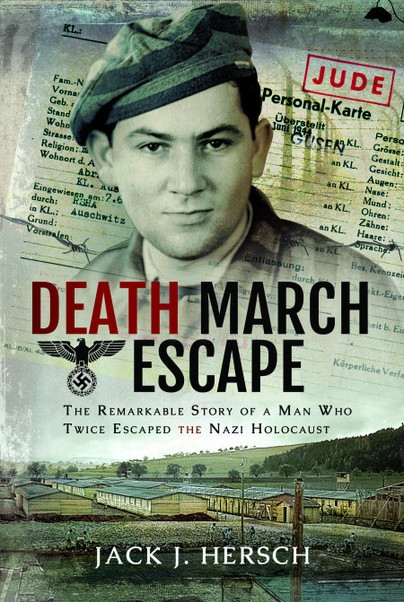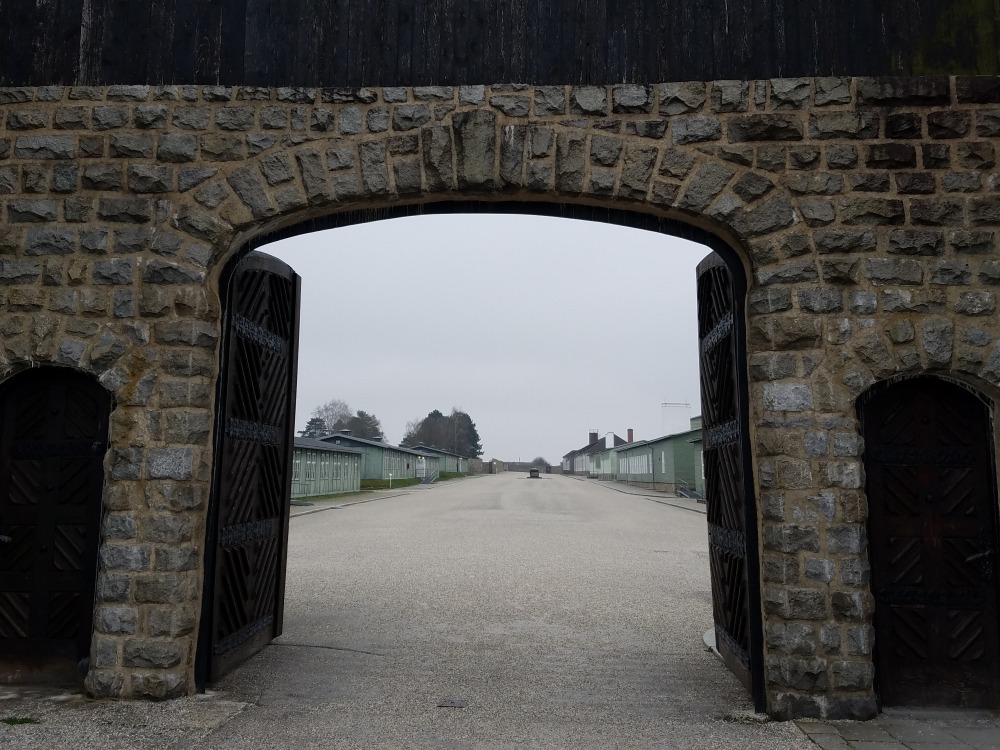| Title: | Death March Escape - The Remarkable Story of a Man Who Twice Escaped the Nazi Holocaust |
| Writer: | Hersch, J.J. |
| Published: | Frontline Books |
| Published in: | 2018 |
| Pages: | 283 |
| ISBN: | 9781526740229 |
| Description: |
As the year 1944 came to an end Nazi-Germany kept being pushed further back. From the east and west the allied forces kept advancing. One of the consequences of this was that the allied forces were getting closer to the concentration camps. The Germans didn’t want to give up their prisoners just like that and moreover they wanted to make as much evidence of the Holocaust as possible disappear. Because of this, extermination camps were dismantled (think of blowing up gas chambers and crematoria of Auschwitz-Birkenau) among others and prisoners were sent on Death Marches, towards other concentration camps more central in Germany. These were marches of many kilometres long under horrible circumstances in which many prisoners froze to death or couldn’t keep up and consequently got executed with a neck shot. Half a year earlier in June 1944 Dave Hersch, an 18-year old Jew, was transported from Dej in Hungary via Auschwitz-Birkenau to Mauthausen. This happened at the peak of the extermination of the Jewish Hungarians. Hersch escaped the possible gassing in Birkenau, but ended up in Mauthausen, which can be considered to have been one of the most horrible camps of Nazi-Germany. The granite quarry and the Deathstairs of Mauthausen were ill-famed. Dave was put to work in the quarry and just managed to survive. Ultimately, he was transported to the nearby KZ Gusen where the horrors of the Holocaust endured. As the allied forces advanced Dave had to join the Death March as well. He went through the eye of the needle several times again and once even managed to escape by acting as a refugee when a column of refugees crossed the Death March. Ultimately, he reached a house where the owner gave him some food, yet who after that still gave him away to a couple SS’ers who brought him back to the concentration camp. More dead than alive, Hersch joined another Death March a couple days later where he managed to escape for good now and went into hiding at the Friedman family, whom with their own lives at risk saved his. The author of this book, Jack Hersch, is the son of Dave and got the idea for writing a book about his father’s experiences when in 2007 he saw a picture of his father as a prisoner on the website of the Mauthausen Memorial. Jack only once had a penetrating conversation with his father about his experiences. That was in 2001. Based on this conversation, Jack attempts to reconstruct his father’s story in this book. He combines this with a trip to Europe, where he visits the places his father has been. He visits Mauthausen and the location of KZ Gusen and reconstructs the escapes of his father. |
| Conclusion: | Jack Hersch writes the story about his father in a well-readable manner. This book displays the search of the part of his father’s story that he didn’t fully know. He takes the reader with him on his search. He describes his discoveries in Austria and combines them with flashbacks from the conversation he had with his father in 2001. The more knowledgeable readers of World War II can sense that Jack Hersch is a layman on the subject, but in general this isn’t too distracting. Here and there are some omissions or wrongly interpreted aspects due to Hersch’s limited knowledge. What is also striking is that this book describes from a strong American point of view. The American reader will be able to connect to a number of anecdotes, whereas the average European will struggle more with this. As a result of Hersch hardly having any knowledge or frame of reference when he spoke with his father in 2001, a significant number of affairs remain unclear or uncertain. During his search and investigation after the death of his father, many questions arise for Jack. Most of these questions remain unanswered or get interpreted by Jack. The lack of elucidation by his father makes indeed that the story is very absorbing to read, yet the historical value of it should accordingly be taken with a grain of salt here and there. |
| Rating: |     Very good Very good |
Information
- Translated by:
- Thijs de Veen
- Article by:
- John Smeets
- Published on:
- 11-12-2019
- Last edit on:
- 08-01-2020
- Feedback?
- Send it!





